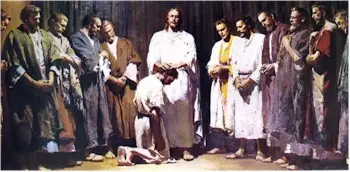12 Apostles of Jesus; Who, How, and Why they were called, and a very special message to the presiding three from God the Father!
1 AND when he had called unto him his twelve disciples, he gave them power against unclean spirits, to cast them out, and to heal all manner of sickness and all manner of disease.
2 Now the names of the twelve apostles are these; first, Simon, who is called Peter, and Andrew his brother, James the son of Zebedee, and John his brother;
3 Philip, and Bartholomew; Thomas, and Matthew the publican; James the son of Alphaeus, and Lebbaeus,whose surname was Thaddaeus;
4 Simon the Canaanite, and Judas Iscariot, who also betrayed him. (Matthew 10:1-4)
At the death of Jesus the keys of the kingdom would automatically fall upon the 12 Apostles of Jesus.<spanlang=en style=”font-size: 10pt; color: black; font-family: Verdana;”> As it happened, there were only eleven worthy Apostles remaining when that time came around, but this body of men was at that time the leadership of the Church of Jesus Christ.</spanlang=en>
Simon Peter was the first one to be called to the Apostleship by Jesus. This made him the Senior Apostle. The order of succession in the Church of the Lord is that the remaining Apostles support the Senior Apostle and ordain him to be the Presiding High Priest over the Church of Jesus Christ. From then on he is the authorized servant to receive revelation from Jesus and Angels on behalf of the Church; he is the Prophet, Seer and Revelator.
Death removes an Apostle whom God has not chosen to lead the church. This may sound drastic, but when the Church of Jesus Christ is become mature, in a world where they are not under constant threat, most of the Apostles will live long lives. All 12 Apostles of Jesus cannot be head of the Church, but their contribution as Apostles is invaluable.
James and John, brothers, were chosen to be counselors to Peter. Counselors to the Presiding High Priest are also of the 12 Apostles of Jesus. They are chosen by revelation. James and John were revealed to be the counselors to Peter even before the death of Jesus:
1 And he said unto them, Verily I say unto you, That there be some of them that stand here, which shall not taste of death, till they have seen the kingdom of God come with power.
2 And after six days Jesus taketh with him Peter, and James, and John, and leadeth them up into an high mountain apart by themselves: and he was transfigured before them.
3 And his raiment became shining, exceeding white as snow; so as no fuller on earth can white them.
4 And there appeared unto them Elias with Moses: and they were talking with Jesus.
5 And Peter answered and said to Jesus, Master, it is good for us to be here: and let us make three tabernacles; one for thee, and one for Moses, and one for Elias.
6 For he wist not what to say; for they were sore afraid.
7 And there was a cloud that overshadowed them: and a voice came out of the cloud, saying, This is my beloved Son: hear him.
8 And suddenly, when they had looked round about, they saw no man any more, save Jesus only with themselves.
9 And as they came down from the mountain, he charged them that they should tell no man what things they had seen, till the Son of man were risen from the dead. (Mark 9:1-9)
When John the Baptist’s dispensation of leadership of the Kingdom ended, and was picked up by the dispensation of Jesus’ leadership, the voice of the Father was heard testifying to the divinity of his Son:
17 And lo a voice from heaven, saying, This is my beloved Son, in whom I am well pleased. (Mathew 3:17)
When Jesus’ earthly ecclesiastical leadership drew near its closing, soon to be followed by the leadership of Peter; (supported by James and John); again the voice of the Father testified of his Son, in much the same way!
It appears as if the earthly leader of The Kingdom receives this special message from the Father. We know that John the Baptist received it. We know that Jesus received it. And we know that Peter received it. Perhaps we should see this as a pattern. Perhaps we should see this as the token, or evidence, of a true head of the Church.
As long as there were twelve witnesses to the mission, life, death and resurrection of Jesus, who were worthy to bear the calling of the holy Apostleship, when one Apostle were lost, he would always be replaced. This way it would always remain a quorum of 12 Apostles of Jesus. This is how Jesus set it up; this was the way the early apostles maintained it, and as long as there are authorized servants of God upon the earth, this will always be the foundation organization of the Church.







